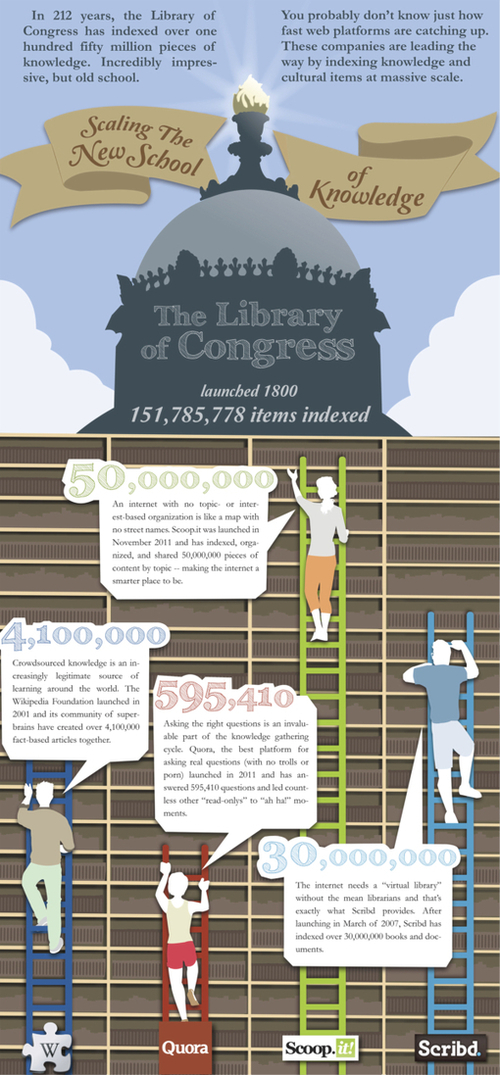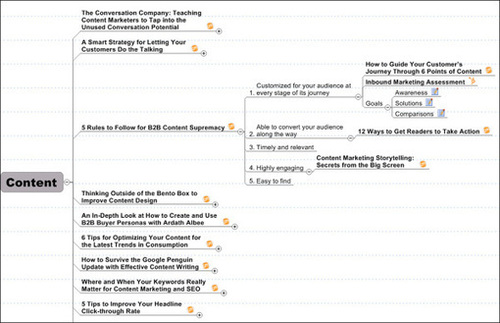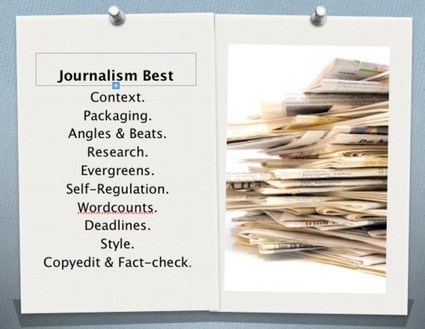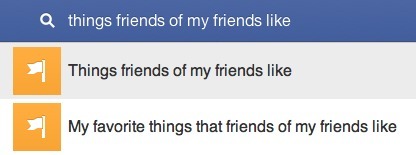Can Facebook People-Centric Model Really Scale?
In 2008, Mark Zuckerberg laid out his theory about people sharing content on Facebook. “I would expect that next year, people will share twice as much information as they share this year, and [the] next year, they will be sharing twice as much as they did the year before,” he said.
This article reminded me of my own post on Business Insider predicting that the Facebook people-centric model will see its limits. Two years and one IPO down the road, we’re exactly there: with 1,500 potential stories to show to an average user news feed every time they visit, Facebook has a tough time determining what’s really important.
Perhaps more importantly, Facebook lost its raison d’etre
Read More4 Steps to Becoming a Modern Sales Professional
“The Internet has changed the role of sales forever (…) what’s even more interesting is the source of where the information is coming from. In most cases it’s not the brand you’re researching, but a highly regarded 3rd party expert – or influencer – in the industry.” [See on traackr.com]
Read MoreHow much is twitter worth (to small businesses)?
Today the third major social network is becoming a public company. As with all major IPO’s, we will read a lot of diverse and conflicting opinions on its valuation: to some Twitter will be an overpriced money-losing startup, to others it will be the next major player of the Web and undervalued.
To add a data point to the debate, the Scoop.it team decided to study the value of social networks to small and mid-size businesses.
Read MoreWhy Bashing Content Curation Is Not The Answer
Eric Wittlake uses a provocative title to list four reasons why content curation is not a silver bullet in b2b content marketing. While I agree with him there are no silver bullets in marketing, he makes some points which I disagree with.
Read MoreWhy we’re more creative when we’re tired, and 9 other surprising things about how brains work
Read MoreYou may be hardwired as an introvert or an extrovert. But don’t worry there are ways to change how our brains work.
Driving revenue with social, content, marketing automation
Slodes of the talk Jason Miller gave at the Scoop.it #leancontent meetup on Sept. 25, 2013.
We recently hosted our event series, #leancontent, with a guest from LinkedIn. His presentation focuses on driving revenue using smart content and optimized distribution steams. Check it out!
See on www.slideshare.net
Read More8 common mistakes in how our brains think and how to prevent them – – The Buffer Blog
What are the biggest thinking mistakes all of us do nearly every day? We’ve collected the 8 biggest thinking mistakes here today for you:
Read More
5 free tools to organize your thoughts | PCWorld
Web-based text outliners range from Notepad-like simplicity to sophisticated, searchable, collapsible idea wranglers.
Read More
10 educational and enlightening Twitter accounts you should follow
Twitter may share some things with Facebook, but it’s ultimately a different beast altogether.
Read More
Content curation for SEO — from professional purposes to personal passions
Editor’s Note: We’ve always held that content curation (with added insight and value) is great for SEO. The below infographic (courtesy of TechMagnate and Beth Kanter) lays out some of the benefits of content curation.
What exactly is content curation? To Scoop.it, its the “meaningful selection and sharing of online content for professional purposes or personal passions.” Professional purposes run the gamut from thought leadership to product marketing, and personal passions can be gathering and sharing knowledge about anything that gets your engine going. Many people curate every day without knowing it — whether it is sharing an insightful article they discovered on their favorite blog or retweeting a thought leader of their choosing. Curation is everywhere!
Read MoreTwo models of success for European startups | Tech Cocktail
29 ways to stay creative [infographic] via dailyinfographic.com

Editor’s Note: As content curators, we sometimes think we might not have anything super interesting to say or struggle to add value on top of the message within the content we’re curating. Here are a few ways to re-spark your creativity while curating! Enjoy!
Stealing images from the web vs using images ethically [infographic] | visua.ly
Editor’s Note: Copyright and fair use of images is oftentimes a difficult set of rules to follow. It’s very easy with the tools available (namely Google Image search) to grab pictures and use them without thinking whether you are using that image fairly or not. While this infographic is a bit self-promotional on behalf of imgembed.com, they are a useful platform for making the web a better, more fair place. Take a look!
Read MoreMedium and being your own platform – Marco.org
Some interesting insights in this article about writing for external sites instead of your own individual “platform.” All of this is based on the assumption, however, that to have a platform, one must have their own blog or original content at all. Is this true?
Read MoreAre you a thought leader?
Ask.com says that a thought leader is an individual or firm that is recognized as an authority in a specialized field and whose expertise is sought and often rewarded. In a world where information is often it’s own currency, thought leaders are seen as a resource because in order to earn that status, they have made a career of focusing on their primary expertise. Being a thought leader has cachet and, according to Malcolm Gladwell, if you spend 10,000 hours focused on one thing, then you’ll end up being an expert at it.
Read MoreScaling the new school of knowledge [infographic] – SocialTimes
Read MoreWeb platforms may one day catch up to traditional institutions like the Library of Congress in their ability to collect and organize millions of documents, according to an infographic by content curation platform Scoop.it.
How to create an idea dashboard to track your favorite content ideas – Conspire: A @Mindjet Publication
Read MoreContent marketing is about more than just great content; it requires application, too. Here’s how to create an idea dashboard to track your favorite ideas.
Learn to test your social — 5 unique social media and blogging tips that helped Buffer reach $1M in revenue
Read MoreFor this article, I wanted to dig out the lesser known tips and tricks for you to make your blogging and social media strategy work.
We’re all responsible for creating a smarter internet | via Business Insider
Brands, companies, and individuals — I think it’s time for some real-talk about content and social media.
Read More5 deadly personal-branding illusions
What the heck is a Personal Branding Illusion? That’s a good question, but it begs the question “What is a Personal Brand?”, so let’s start there.
Read MoreThe bankers of the knowledge economy
Curating and sharing stories should be understood as part of a knowledge economy. If stories are tribal currency, then curators are money handlers.
The world has changed and so did the economy. From an agricultural to an industrial world, we’ve now moved into the post-industrial era where knowledge is the true currency and a lot of us are knowledge workers.
In this great post, Elia Morling explains how he views content curators as playing a key role as a “money handlers, changers and lenders all wrapped into one.”
See on tribaling.com
Read MoreShould social networks curate their own content? Or should users do it?
The challenge [for social networks] is to create something of permanent value for the community, to offer more than a temporary spotlight.
Austin Powell comes back on PaidContent the recent announcement by Tumblr to shut down Sotryboard and lay off the editorial team that was highlighting and curating Tumblr’s best content.
He makes a point that it’s been extremely hard for most social networks – with the notable exception of LinkedIn with its influencer program – to add value by curating its users’ best content.
I wonder whether that’s actually such a big deal.
Read MoreHow UserVoice Keeps Customers (Happy) Through Content
In this week’s edition of Scoop.it’s lean content meetup, we were honored to welcome the the Content & Community Director of UserVoice, Evan Hamilton.
In our last #leancontent meetup, UserVoice’s Evan Hamilton shared some great advice on creating and distributing content. The main questions answered included:
1. Why Content?
2. What Type of Content Should I Create?
3. How Should I Distribute my Content?
4. How do I Reap the Benefits of Content?
5. What Tips Can You Provide for Content Creation?
Check out the writeup to find out the answers!
See on leancontent.it
Read More6 Tricks to Maximize the Impact of Your Tweets
Did you know that there’s a place where many of your customers live and actually want to talk to and hear from you in real time? It’s a magical land, it’s real, and it’s called Twitter.
Twitter is one of the most efficient tools out there to connect with your audience, to share engaging information and content, and even to provide personal customer service. If you do it right, it’s a gold mine; if you don’t, it could result in disaster.
It may be true that “gold mine” and “disaster” are the two extremes and that it’s possible to be alright at Twitter, but who strives to be mediocre? If you want to rock it and make sure each and every tweet is the best it can possibly be, take these 6 tips into consideration the next time you sit down to write the perfect tweet.
See on leancontentmarketing.tumblr.com
Read MoreReach escape velocity through lean content marketing
These are the slides of my talk at the Product Summit last week in San Francisco. Some say “good products don’t need marketing”. But from researching the problem you plan to solve to building the initial community around your product and evangelizing your market, content is involved all the way. So how can startups and small product teams be efficient and impactful with their content strategy?
Some key takeaways from an awesome presentation by Guillaume on Lean Content Marketing:
Marketing Matters!
The myth that not all startups need marketing is simply untrue.
Marketing is more than just talking about your product.
Though publicizing product launches, updates, and new releases is a part of marketing, it doesn’t do the trick on its own, but content marketing can be costly and time-consuming. The solution?…
#leancontent
- Leverage SlideShare presentations to share your vision
- Guest post to distribute your ideas
- Answer Quora questions that relate to your field
- Curate content relevant to your expertise
See on www.slideshare.net
Read MoreScrappy Storytelling with K.Tighe
Recently, we had the pleasure of hosting a meetup at Scoop.it HQ in San Francisco about a new concept we are developing in tandem with the community called #leancontent. Roughly, #leancontent is an evolution of content development and content marketing strategies.
Read MoreThe Big Problem With Facebook's Graph Search: Privacy Constraints | Fast Company
“If the future of search is likely to be social, the future of social is likely to involve more search.”
This is a post I wrote for Fast Company on the conflicting tension I immediately saw following the launch of Graph Search by Facebook. Facebook’s new search tool will either have to remain private, resulting in limited, biased content, or make private data accessible to search.
Here’s why.
See on www.fastcompany.com
Read MoreStudents of All Ages Must be Trained to Curate Content
“Students of all ages must be trained to search, select, qualify (and therefore disqualify), then enrich with their own thought, and then use and share information.” – Marc Rougier, Co-Founder, Scoop.it
From Daily Edventures:
Educators often see the Internet as a double-edged sword. While the Web provides nearly limitless information on any given topic, that information is often unfiltered, unedited and unfocused. That’s where Marc Rougier and his company, Scoop.it, come in. While their tools were originally created to help marketers and entrepreneurs increase their online visibility, the company quickly discovered that teachers and students found the curation tool invaluable.
“Since the explosion of Web 2.0,” Rougier says, “we live in a world of information overload: everyone has become a producer of information.” This abundance of information, according to Rougier, has generated a double problem: “If everyone can speak, to whom should I listen?” (a problem of qualification of information — extracting the signal from the noise), and “If everyone can speak, how can I get heard?” (a problem of acquiring visibility, reputation, and a voice).
Here, the mission is to get students aware of the importance of information management — to let them really touch, first hand, the challenge of qualification and organization of data – whatever their subject of study. We live in a world of information abundance and (almost) information democracy. Yet, if we are not prepared for it, we can be force-fed by a very small amount of data (a unique video seen a billion times…) and even by false information, and let a vast amount of valuable data be wasted. Students of all ages must be trained to search, select, qualify (and therefore disqualify), then enrich with their own thought, and then use and share information.
See on dailyedventures.com
Read More7 Ways To Make Your Brand Look Terrible On Social Media
2012 was quite the year for social media blunders. From American Apparrel offering a 20% coupon to help the victims of Hurricane Sandy deal with their “boredom,” to #McDStories to the worst hijacked hashtags, some brands proved that they need more than a few tips.
It’s time to be frank. Here are 7 ways to make yourself look terrible on social media. (Pro tip: you’re not supposed to do them.)
See on www.businessinsider.com
Read MoreHow Google Author Rank could change content marketing… and journalism
Here’s a little piece of SEO nerdery that affects us all: Google is using Google+ to influence search results in a big way, and brands and media organizations alike have yet to wake up to the…
Erin Griffith analyzes how the use of authorships combined with Google+ is now impacting Google search results.
This change is not new but, as she puts it, it is significant: “Google was always about the algorithm, not curation, certainly not curation through something as, well, human as a social network. The emphasis before was about what was on the page not who wrote it.”
While she focuses on the new importance of authorship given by Google, what’s happening is actually a mix of a couple of things which are in my opinion equally good:
- Authorship
- Social results
#1 means that an identified, reputable author will prevail; #2 is part of the social signal that Google uses more and more to rank results and that builds on curators’ activity.
Bottom line is that – as I predicted a while ago – the age of low-quality content cheaply produced by random anonymous writers in content farms for pure SEO purposes is over. By combining a measure of the author’s influence as well as taking into account curators’ appetite for a piece of content, Google is bringing quality back in the game. Which is good for authors, curators and… readers.
See on pandodaily.com
Read More
























